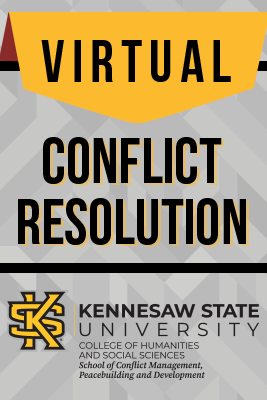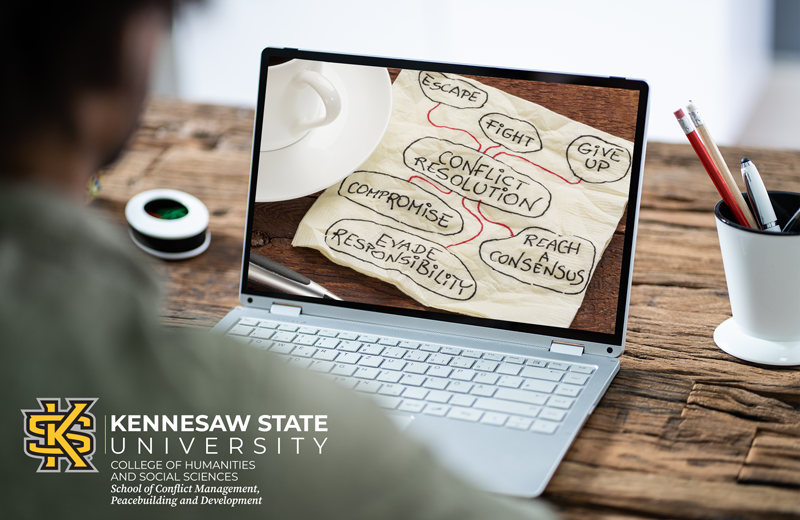CV-19 Crisis Brings Heightened Need for Community-based Conflict Resolution

Conflict Management alumni have been reaching out to describe the ways their Conflict Management degrees have been put to use during the Coronavirus crisis
KENNESAW, Ga. (Apr 8, 2020) — Crisis breeds conflict. The stress of economic uncertainty and dislocation caused by CV-19 are only outpaced by the anxiety many feel for the safety of their loved ones. In these difficult times, Conflict Management specialists are increasingly called upon to assist in both formal and informal ways. Our alumni have been reaching out to describe the ways their Conflict Management degrees have been put to use in this crisis.

Human Resource Professionals
HR professionals have sought advice on how to deliver bad news, when large and small companies must furlough employees. Key messages to convey include: A) Make sure they know this is not tied to their productivity or work ethic, “You are a valued employee and we will call you back as soon as work resumes”; B) Provide hope, “Here is a list of local resources including the food bank, united way, unemployment office, housing assistance, etc.” C) Over communicate: “This is what we know, this is what we do not know, and this is when we will update you”. When employees lack adequate information, they often fill in the gaps by turning their worst fears into a mental reality which becomes gossip and goes viral. Share all available information and share it often. Touch base with them periodically during the furlough period to ensure them they are not out of sight and out of mind.
Family Violence Matters
Domestic violence increases during periods of unemployment and crisis, especially when families are sharing cramped homes and insufficient resources such as computers, internet, food, and emotional energy. Parents are working from home and home schooling, leaving little energy to recharge their own emotional batteries or to find time to be alone as adults/couples. Conflict Management/Resolution specialists are being called upon to provide marital mediation, parent-teen mediation and even neighborhood conflict management. Typically, these sessions involve a mediator/facilitator who seeks to identify the root causes of conflict, then helps the parties to develop ground rules designed to avoid or resolve future conflict through the creation of shared expectations. They also assist parties to better develop their communication and conflict resolution skills so they may better resolve their own disputes in the future. For parents and teens, this process often involves a list of rights and responsibilities for both the parent and teen, which gets longer as the child gets older and exhibits success. For example: the teen has the right to play video games for 2 hours (right) AFTER all homework is finished (responsibility). Then penalty for violation is 2 days with no gaming. The parent has the right to use his/her home office to complete required conference calls (right) but will ensure the teen has enough time on the computer to complete homework and still engage in 2 hours of gaming (responsibility).
Parenting Time Disputes
Some parents have withheld their children from court-ordered visitation schedules out of concerns that exposure to multiple households will increase the risk of infection. Courts around the country have issued guidance which generally states that regular visitation should occur in spite of stay-at-home orders. However, if the away parent is sick or has been exposed to Covid-19, there may be good reason to postpone scheduled parenting time. Police will not generally get involved in these matters, but will instead suggest that parents seek court action if they feel the other parent has violated a court-ordered parenting plan. However, that could take months while the courts are closed and then triaging cases with a priority placed on criminal and urgent matters of life and safety. Conflict Management specialists and family mediators can assist families in their attempt to negotiate these matters along with reaching shared expectations about how exposure, safety and home schooling will be managed collaboratively. They can provide these services informally through shuttle diplomacy or conference calls (or Zoom, Webex, etc.) and can do so for free or on a fee basis. The trick is spreading the word about the availability of these services. Try using social media, Neighborhood list servs and word of mouth.
Teleconference and Online Dispute Resolution Services
Courts may be closed, but disputes do not cease. Many mediators and conflict resolution specialists are offering their services formally and informally via teleconference, zoom, Microsoft Teams and other platforms in order to assist parties to reach mutually-agreeable resolutions to their disputes. If parties reach and submit and agreement to the court (for formal disputes), many judges will sign off on those agreements and waive any hearing, thereby allowing progress to be made on pressing matters without the need of a hearing during the time in which the courts are only addressing emergency matters such as protective orders or arrest warrants.
There are many more ways in which Conflict Management specialists may assist their communities during the Covid-19 Crisis. Feel free to share yours by writing Dr. Susan S. Raines at sraines@kennesaw.edu
Susan S. Raines is a Professor and the Associate Director of the School of Conflict Management, Peacebuilding and Development at Kennesaw State University and the author of Conflict Management for Managers (2019, Rowman and Littlefield).











